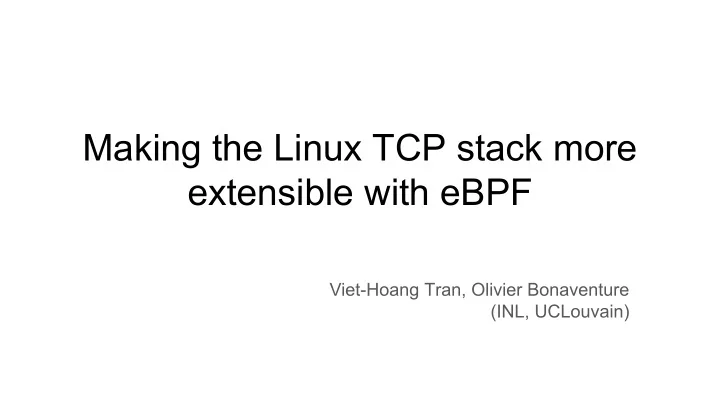

Making the Linux TCP stack more extensible with eBPF Viet-Hoang Tran, Olivier Bonaventure (INL, UCLouvain)
Supporting new TCP option The standard way to extend TCP But implementation? requires kernel changes
Supporting new TCP option is hard True for just experiment More with deployment: upstreaming patches?
Stand on the shoulders of giants... Based on TCP-BPF by Lawrence Brakmo TCP-BPF (since 4.13) already has: ● Hooks at different phases of a TCP connection or when connection state changes ● Read & write to many fields of tcp_sock ● Indirect access with bpf_getsockopt, bpf_setsockopt ● ...
Add new option: 2 steps TCP Layer IP Layer tcp_write_xmit() ... tcp_send_ack() tcp_transmit_skb() tcp_options_write() tcp_retransmit() BPF VM ... adjust tcp_options_size write new option One more thing: update current MSS
Parse new option IP Layer TCP layer tcp_v4_rcv() ... ip_rcv() tcp_parse_options() tcp_v6_rcv() pass new option BPF VM TCP-BPF program processes new option
Overhead Disable hooks by default ● iperf3 transfer over 10 Gbps link ● trigger on every packet Average Throughput (Gbps) Sender's CPU usage (%) Receiver's CPU usage (%)
Extreme (and unrealistic) benchmark over loopback interface trigger on every packet Average Throughput (Gbps) RTT (usecs)
Use cases
User Timeout Option TCP User Timeout (UTO): max time waiting for the ACK of transmitted data before resetting the connection RFC 5482: TCP option to announce/request this value
Congestion Control Request Option Receiver requests the sender to use a desired CC algorithm for the connection E.g. Clients prefer low latency over throughput Two sides shared the list of CC beforehand
Initial CWND option When the receivers know more about the network bottleneck.
Delayed ACK Option Motivation: Too many ACKs or too few ACKs is not good. → The need to know remote’s ACK delay strategy … or to request the desired configuration This option carries two values: Delack timeout: relatively as a fraction of RTT Segs count: Number of received segs before sending an ACK
What about the middleboxes? RFC 6994: “Shared Use of Experimental TCP Options” (PROPOSED STANDARD) Network operators “should” support (or fix it otherwise)
Code Status Caveats ● Option size <= 4 Bytes, extensible to 16 Bytes ● Decouple from cgroup-v2?
Making the Linux TCP stack more extensible with eBPF
Making the Linux MPTCP stack more extensible with eBPF
Path Manager Which path to create/remove? Which address to announce? → Should be controlled by application / user ? ? 18 Slide from Netdev0x12. Smartphone and WiFi icons by Blurred203 and Antü Plasma under CC-by-sa, others from Tango project, public domain
Supporting user-defined Path Managers (PM) Netlink-based PM framework + Available in mptcp-trunk branch (out-of-tree) + Control plane in uspace + Clean layering Issues: ‐ Under high load, netlink messages may be lost ‐ Need separated facilities to support: - set/getsockopt (e.g. access subflow-level info) - TCP state change notification - policy to refuse the establishment of a subflow
What if eBPF-based approach + Performance + Built-in support for TCP state tracking + Easy to apply custom policy on subflow establishment - Restricted by current eBPF limits - Less layering separation? - BPF program can be called from different contexts → Locking is trickier
Our prototype New TCP-BPF callbacks To track events: To store local/remote addresses and subflows: BPF maps helper function To open a subflow:
New TCP-BPF callbacks to track events No more than 3 arguments ● MPTCP Session created ● MPTCP Session established ● MPTCP Session closed (e.g. fallback to regular TCP) ● Subflow established ● Subflow closed ● Remote IP address added/removed
Extend TCP-BPF context Extend struct bpf_sock_ops with mirrored fields from struct sock: mptcp_loc_token mptcp_rem_token mptcp_loc_key mptcp_rem_key mptcp_flags
Open subflows via helper function: mptcp_open_subflow () ● (bpf_sock, srcIP+port, dstIP+port) as input ● if a field of tuple is unset: use existing or kernel-assigned IP/port ● extract meta_sk and other mptcp info from bpf_sock But usually, we are in softirq context: cannot open subflow directly → Schedule into workqueue instead → subflow is actually opened later
Examples Two minimal PMs were implemented as BPF programs: ndiffports PM: ~20 LoCs fullmesh PM: ~200 LoCs
Open issues Handle events of local IP address changed: Need to send events to each BPF program in each cgroup Remove subflows: (already done automatically in kernel when receiving a REMOVE_ADDR option) Store the subflows? or query on-demand? Dual-stack support: would be similar to bpf_bind()? Multiple PMs? e.g. each PM per netns
Wrap up More details in our paper Git repository: https://github.com/hoang-tranviet/tcp-options-bpf hoang.tran[.at.]uclouvain.be
Backup slides
Recommend
More recommend